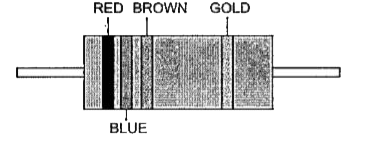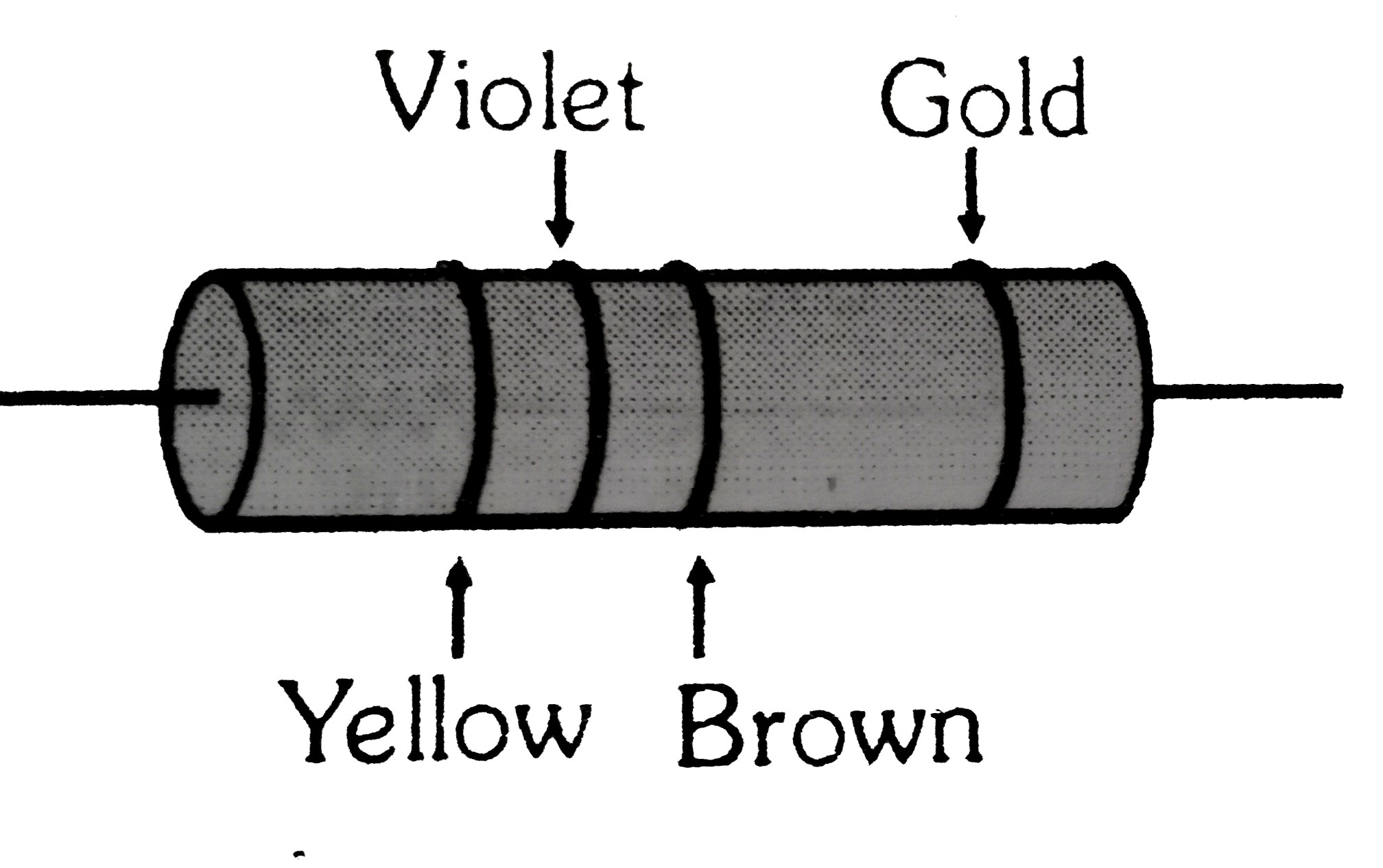A carbon resistor is marked in colour bands of red, black, orange and silver. What is the resistance and tolerance value of the resistor?
To determine the resistance and tolerance value of the carbon resistor marked with the color bands red, black, orange, and silver, we can follow these steps:
1. Identify the Color Codes:
- The color bands on the resistor are red, black, orange, and silver.
- According to the standard resistor color code:
- Red = 2
- Black = 0
- Orange = 3 (indicates the number of zeros to be added)
- Silver = 10% (indicates the tolerance)
2. Determine the Value from the Color Bands:
- The first two colors (red and black) give us the significant digits:
- First digit (red) = 2
- Second digit (black) = 0
- Combine these digits to form the number: 20.
3. Add the Zeros:
- The third color (orange) indicates how many zeros to add to the number formed by the first two colors.
- Since orange corresponds to 3, we add three zeros to 20:
- 20 followed by three zeros = 20,000 ohms.
4. Determine the Tolerance:
- The last color (silver) indicates the tolerance of the resistor.
- Silver corresponds to a tolerance of ±10%.
5. Final Result:
- Therefore, the resistance value of the resistor is 20,000 ohms with a tolerance of ±10%.
Summary:
- Resistance: 20,000 ohms
- Tolerance: ±10%
- The color bands on the resistor are red, black, orange, and silver.
- According to the standard resistor color code:
- Red = 2
- Black = 0
- Orange = 3 (indicates the number of zeros to be added)
- Silver = 10% (indicates the tolerance)
- The first two colors (red and black) give us the significant digits:
- First digit (red) = 2
- Second digit (black) = 0
- Combine these digits to form the number: 20.
- The third color (orange) indicates how many zeros to add to the number formed by the first two colors.
- Since orange corresponds to 3, we add three zeros to 20:
- 20 followed by three zeros = 20,000 ohms.
- The last color (silver) indicates the tolerance of the resistor.
- Silver corresponds to a tolerance of ±10%.
- Therefore, the resistance value of the resistor is 20,000 ohms with a tolerance of ±10%.
- Resistance: 20,000 ohms
- Tolerance: ±10%
Topper's Solved these Questions
- DC CIRCUITBOOK - VMC MODULES ENGLISHCHAPTER - DC CIRCUITEXERCISE - LEVEL-0 SHORT ANSWER TYPE
9 Videos
- DC CIRCUITBOOK - VMC MODULES ENGLISHCHAPTER - DC CIRCUITEXERCISE - LEVEL-0 SA-II: Short Answer Type - II
12 Videos
- CURRENT ELECTRICITYBOOK - VMC MODULES ENGLISHCHAPTER - CURRENT ELECTRICITYEXERCISE - IN-CHAPTER EXERCISE-F
10 Videos
- DYNAMICS OF A PARTICLEBOOK - VMC MODULES ENGLISHCHAPTER - DYNAMICS OF A PARTICLEEXERCISE - JEE Advance (Archive) Level - II (SINGLE OPTION CORRECT TYPE )
31 Videos
Similar Questions
Knowledge Check
A resistor is marked with the rings coloured brown, black, green, and gold. The resistance in ohm is
A(3.5×105±5%)B(1.10×105±10%)C(8×106±5%)D(1×106±5%)A carbon resistor has coloured bands as shown in figure below. The resistance of the resistor is :
 A26Ω±10%B26Ω±5%C260Ω±5%D260Ω±10%
A26Ω±10%B26Ω±5%C260Ω±5%D260Ω±10%
A carbon film resistor has cololur code green, black, violet, gold. The value of the resistor is
View SolutionCarbon resistors, used in electronic circuits are marked for their value of resistance and tolerance by a colour code. A given resistor has colour scheme brown, red, green and gold. Its value in ohm is
View SolutionA carbon resistor has coloured strips as shown in igure. What is its resistance?

View SolutionFind the resistance of following carbon resistor.

View SolutionWhat is resistance of following resistor.

View SolutionA 2 W carbon resistor is color coded with green, black, red and brown respectively. The maximum current which can be passed through this resistor is :
View Solution


